Don’t forget to remember!
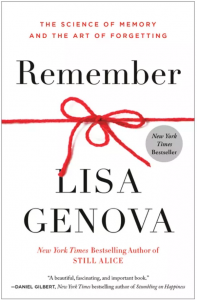
As a professional organizer it was part of my job to help people find ways to remember stuff:
- Where are my keys?
- Where does this go?
- How do I remember tasks?
- Why do I forget appointments?
- Why can I never find the remote?
Together, we created solutions and systems ala takeaways #2, 8, 9 in the list below.
Often they worry that forgetting things is a sign of Alzheimer’s. So, one time I wrote a blog post called “No, you don’t have Alzheimer’s!” Then I got a client who was worried about getting the dreaded disease on the basis that it ran in her family. Oops. I didn’t want to be flippant about it. So I renamed the blog post Getting Organized Prevents Memory Loss. Which isn’t quite right either. I mean, if you really do have it, getting organized will help…a lot…for awhile…
The post included a couple of statistics about Alzheimers, and why you probably don’t have it, but, well, I’m no neuroscientist.
Enter Lisa Genova, who is a neuroscientist.
It's comforting to know that forgetting is normal, but it helps to understand why it happens and what we can do to remember important things. Share on XBook club
 Many years ago I read, and loved, Lisa’s novel Still Alice. It chronicles fictional Alice’s descent into Alzheimers, so yeah, it’s sad. But it’s also funny, and touching, and ever-so-insightful. Eventually, Juliette Moore won an Oscar for playing the movie version of Alice, which I also recommend.
Many years ago I read, and loved, Lisa’s novel Still Alice. It chronicles fictional Alice’s descent into Alzheimers, so yeah, it’s sad. But it’s also funny, and touching, and ever-so-insightful. Eventually, Juliette Moore won an Oscar for playing the movie version of Alice, which I also recommend.
But I didn’t know the author was an actual neuroscientist until I learned about her 2021 book called Remember: The Science of Memory and the Art of Forgetting.
I uncharacteristically chose the book for my book club without having read it first. I figured if a neuroscientist could write Still Alice, her non-fiction book might also be quite readable. And I was right! We just met and discussed it, so I’m writing this now before I — ahem — forget what I want to say about it.
My goal was to help everyone (including myself) to feel better about forgetting stuff, while also gaining insight into why it happens and what we can do when it’s important to remember.
My main takeaways
Forgetting is normal. Yes, it happens more with age, but that doesn’t mean you have Alzheimers. (See? I was right!) Can you imagine how cluttered your brain would be if you never forgot anything? (Lisa describes a few people like that in the book and it’s not as fun as you might think.)
You can’t remember something you never paid attention to in the first place, like where your car is parked. (Solution: Pay attention. Be mindful. Easier said than done, but worth it.)
Not being able to find your keys is normal. (Solution: Create a “home” for them and pay attention when you set them down.) Finding them in the refrigerator might indicate a problem. You probably do have Alzheimer’s if you look at your keys and don’t know what they are for.
Everyone in the book club agreed that the book has made them feel more forgiving of themselves when they forget things. They now have more tools for remembering. And it has made them more understanding of others who forget. It’s comforting to know that forgetting is normal, but it helps to know why it happens and what we can do to remember important things.
More takeaways
Here are the top 10 takeaways from Remember according to the terrific Book Club Kit on Lisa Genova’s website (please think of this as a preview and read the whole book if you’re the least bit interested in this subject):
- Effective remembering often requires forgetting.
- Attention is essential for creating a memory of anything. You can’t remember what you didn’t pay attention to.
- We don’t remember most of our lives.
- A full night’s sleep enhances your ability to establish long-term memories and reduces your risk of Alzheimer’s.
- Your memories of what happened are full of additions, omissions, elaborations, and errors.
- Being chronically stressed about your memory will impair it.
- Emotional experiences are better remembered than neutral ones.
- Repetition makes your memories stronger.
- Prospective memory is your memory for what you need to do later. Our brains are terrible at this. Use To-Do lists, calendars, and sticky notes instead of your brain.
- We remember what is meaningful.
My Goodreads rating: 5 stars! *****
Book Club discussion rating: Excellent!
Alzheimer’s
Although two of the eighteen book chapters are about Alzheimer’s, this section of the post is from me, not from Lisa Genova.
As the Alzheimer’s Association website states:
There is no single test that can determine if a person is living with Alzheimer’s or another dementia. Physicians use diagnostic tools combined with medical history and other information, including neurological exams, cognitive and functional assessments, brain imaging (MRI, CT, PET) and cerebrospinal fluid or blood tests to make an accurate diagnosis.
The website goes on to list a number of types of available tests, treatments, and additional helpful information.
And, because I’m a genealogist with an interest in DNA testing, of course I Googled “Alzheimer’s DNA test”. As the National Institute on Aging website states:
In most cases, Alzheimer’s does not have a single genetic cause. Instead, it can be influenced by multiple genes in combination with lifestyle and environmental factors. Consequently, a person may carry more than one genetic variant or group of variants that can either increase or reduce the risk of Alzheimer’s.
Importantly, people who develop Alzheimer’s do not always have a history of the disease in their families. Still, those who have a parent or sibling diagnosed with the disease have a higher risk of developing Alzheimer’s than those without that association.
So, it sounds like DNA testing would be less than conclusive.
I understand that getting oneself tested, in whatever way, can be super-scary. But if my family had a history of it, I would want to know where I stand. And I would want to learn as much as possible about the latest treatments. If drugs would allow me to maintain my current cognitive level I would take them. But, for the record, if I had deteriorated to the point where I couldn’t even make these sorts of decisions for myself, I would not want drugs to prolong my life.
Memory Roundup
For your convenience — and mine —I have gathered a number of my previous blog posts related to memory. (I could have suggested that you search my site for the keyword “memory”, but that list would also include all the posts about memorializing loved ones, organizing keepsakes, and leaving a legacy.)
Getting Organized Prevents Memory Loss
Wanna know my #1 time management tip?
It’s All About the Labels (not the label makers)
What is Your Clutter Costing You?
How to Live and Work by Design, not by Default
Why do I take before and after photos?
This Photo Trick Cures Clutter Amnesia!
More mindfulness. Less clutter.
If you can’t find something, clean up!
There’s no Reason to Freak out…Unless…
Do you have trouble remembering, and do you worry about forgetting?
Are you familiar with Lisa Genova? Might you read her book(s)?
What memory tricks do you like and want to share with us in the comments below?
______________________________________________________
- Hazel Thornton is an author, genealogist, and retired home and office organizer.
- Hung Jury: The Diary of a Menendez Juror
- What’s a Photo Without the Story? How to Create Your Family Legacy
- Go With the Flow! The Clutter Flow Chart Workbook
- Feel free to link directly to this post! Click here to ask about other uses.
- Copyright 2024 by Hazel Thornton, Organized for Life and Beyond
___________________________________________________________
.
Share this:


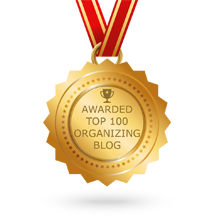

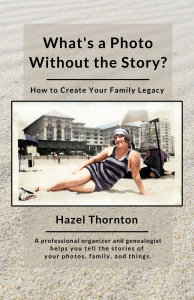
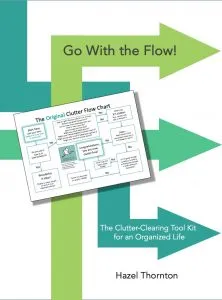
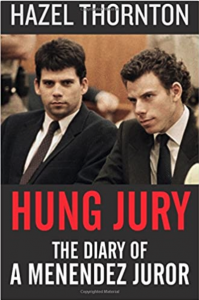
Hi Hazel,
This is so good and I am sure so reassuring for so many people. I love your takeaways. They just make so much sense. Wow, you have written so many posts on this topic. Well done!
Thanks, Kim! We worry about so many things. Worrying about forgetting just makes us forget more!
A lot of good points here. Being mindful of what we do is a big one. I have a lot of routines and habits that I do without really being mindful. In fact, I might be thinking about a totally different topic. Then as you step out of the shower, you wonder if you did condition your hair or just wash it.
When I have clients putting things away that have been laying out for a long time, I ask them to take a mental picture of where they put it.
I have heard of both books but not read them. They are going on my to read list.
Thanks, Jonda! “Take a mental picture” is good. If they really do have memory issues, though, taking a physical picture would be even better for some things, like a parking spot or the contents of an opaque container.
My sister recently apologized for not remembering when a specific event was happening in my life, but I wouldn’t have expected her to, unless she made note of it. I think our brains are so full of things we have to do that there’s no room for the things we don’t have to do anything about – like other people’s schedules.
I find myself writing down a lot more things these days, both the things I NEED to know (my own commitments) and the things I WANT to know (e.g. when is my friend going out of town?)
Same here. It came up on a family Zoom call that I’d been on Oprah (decades ago) and one of my brothers said he didn’t remember that. Well, it happened to me, not to him. And, as you can imagine, I have lists, and lists of lists!
P.S. I blogged about Still Alice and four other novels about memory loss at https://janetbarclay.com/5-novels-about-memory-loss/, if you’d like to check out my post.
I love this review! And what an important topic. So many people automatically think they have cognitive decline when they can’t remember things. And as you mentioned, some of that does come naturally with age. But it doesn’t mean you have dementia or Alzheimer’s.
It’s comforting to read your top 10 takeaways. The most interesting one is the first, “Effective remembering often requires forgetting.” That puts a positive spin on those times we forget because it gives us a cue or nudge to figure out a solution. So, if you can’t find the keys, create “a home.” Set up a sound calendar/buzzer/reminder system if you can’t remember your appointments.
Yes, I agree; just because one is forgetful, one doesn’t have Alzheimer’s. I heard a quote by a neuroscientist recently where she stated that our brains are not intended to recall everything. So, taking the time to write things down is key to keeping on top of tasks.
I remember that book Still Alice so well. It really got to me. I remember thinking how funny it was at the end, when she had forgotten so much, that she had a better relationship with her daughter. Every cloud has a silver lining, right?
I don’t naturally remember things well. I remember things best when I see them in a movie. While this is handy for trivia nights, it isn’t very helpful in remembering useful information. I should have had my entire history education in a movie.
My husband and daughter have photographic memories. They just amaze me. They don’t remember where they saw something or learned about something, but the information remains in their heads and easily retrievable. So impressive! I’m jealous!!
I usually need to focus on something at least three times in order to remember it, and even then, I forget things. I rely heavily on my calendar, task list, and other tools to keep me remember what matters.
I loved all your observations about memory – they are all so true. Funny how we remember the same event differently. I do think emotion has a role in all of this, especially memories of childhood.
I’m terrified of Alzheimer’s, more so than of any cancer. I have been blessed with a good memory, such that I feel like it’s part of my identity. I mostly have a good memory for things I’ve learned and a great biographical memory, though not one of those Marilu Henner “Name a date any time since I was two and I can tell you what happened that day” called “highly superior biographical memories.” My day, and my life, always runs in a little film in my head, so when someone asks, “Wait, when did we discuss that?” I can say, “Well, it happened when you were at X, and that was two days after Y, which happened on the Wednesday before we were going to do Z but couldn’t because of what happened.” And people just look at me like I’ve grown a third head.
So far, I don’t have an age-related decline, but I do see, when I’m overly stressed or tired, a reduction in the speed of being able to recall information. Normally, my recall is immediate. If something takes me more than two or three seconds to remember, I start to feel panicky and have to take a breath and tell myself that it will come to me. I realize ten seconds would not be horrifying but for me, it’s like someone drilled a hole in me and my brain fell out!(Hazel, as you’ve seen, I was absolutely maddened when I couldn’t remember a word that was on the tip of my tongue.) I’m not sure whether my organizing skills help me entrench my memories or my memory inclines me toward caution in how I organize things, but either way, I’ll be remembering this post long into the future.
This also reminds me that Paper Mommy lost her keys about 10 years ago, and a “psychic” nurse at the hospital where my father was being treated told her where to find them, and sure enough, she did. They were in the cupboard with the potatoes. They were the first thing she put away upon getting home from the grocery store, before she ever took off her coat, and she probably didn’t notice her keys were in her hand, let alone when they weren’t. No attention, no encoding, no memory. Check the potatoes!
I think you’ve comforted many with this post, and drummed up some fans for Lisa Genova!
You describing your memory and the way it work sounds exactly like mine.
This is wonderful information. Alzheimer is scary when we hear and see more about it. Social media and the internet helped spread the information faster and with details. Thanks for posting.